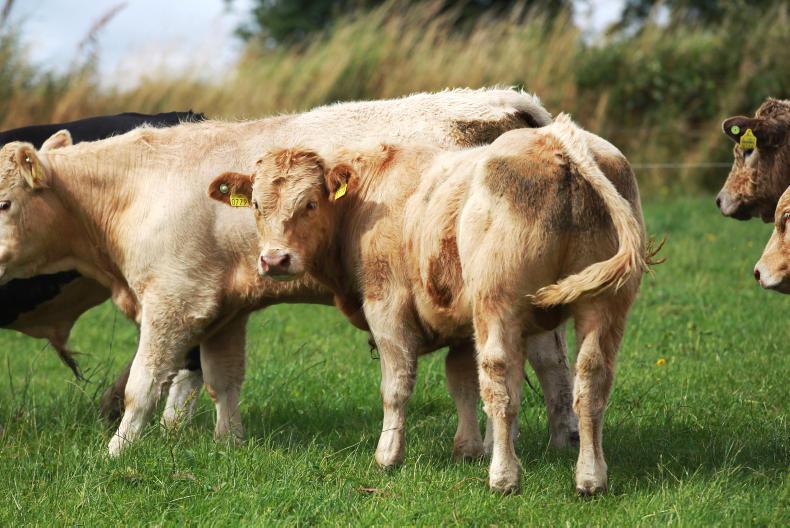Suckler farmers will receive up to €90/calf under the new suckler-focused Beef Environmental and Efficiency Programme, the Irish Farmers Journal can reveal.
The scheme will pay a combined total of €90/calf for the first 10 calves and €80/calf thereafter, up to a maximum of 100 cows.
Payment will be made on the number of unweaned calves born on the holding between 1 July 2019 and 30 June 2020. Applications must be submitted online and the closing date for applications is 15 May 2020.
To be eligible for payment, the calf must be sired by a beef-bred bull and a beef-bred suckler cow.
Once the farmer submits cow/calf weights, €50 will be paid on the first 10 cows and €40 per cow/calf unit thereafter.
Another €30/calf will be paid for meal feeding. Meal feeding must be introduced four weeks pre-weaning and fed until two weeks post-weaning, to reduce stress on calves at weaning time.
Farmers can also choose to implement a vaccination programme instead of meal feeding. The payment rate will be €30/calf.
Vaccinations
The vaccination programme can be a one- or two-programme to cover pneumonia strains RSV and PI3. An IBR vaccine (one or two shots) must also be given.
The scheme will also pay €10/cow for faecal egg testing cows for liver or rumen fluke.
Farmers do not have to have been a participant in BDGP or a previous participant in the BEEP scheme to apply.
Minister for Agriculture Michael Creed told the Irish Farmers Journal the scheme “builds on the success of the 2019 pilot and marks the latest income support measure I’ve made available for beef farmers in recent times.
“The programme seeks to increase economic and environmental efficiency in the suckler herd though improvement in the quantity and quality of performance data collected with a view to supporting the adoption of best practice and more informed decision-making at farm level,” he said.
Read more
Way Out West: sucklers, sheep and contract rearing in Leitrim
Green light for increased capacity for calves at Cherbourg
Agri events cancelled due to coronavirus
Suckler farmers will receive up to €90/calf under the new suckler-focused Beef Environmental and Efficiency Programme, the Irish Farmers Journal can reveal.
The scheme will pay a combined total of €90/calf for the first 10 calves and €80/calf thereafter, up to a maximum of 100 cows.
Payment will be made on the number of unweaned calves born on the holding between 1 July 2019 and 30 June 2020. Applications must be submitted online and the closing date for applications is 15 May 2020.
To be eligible for payment, the calf must be sired by a beef-bred bull and a beef-bred suckler cow.
Once the farmer submits cow/calf weights, €50 will be paid on the first 10 cows and €40 per cow/calf unit thereafter.
Another €30/calf will be paid for meal feeding. Meal feeding must be introduced four weeks pre-weaning and fed until two weeks post-weaning, to reduce stress on calves at weaning time.
Farmers can also choose to implement a vaccination programme instead of meal feeding. The payment rate will be €30/calf.
Vaccinations
The vaccination programme can be a one- or two-programme to cover pneumonia strains RSV and PI3. An IBR vaccine (one or two shots) must also be given.
The scheme will also pay €10/cow for faecal egg testing cows for liver or rumen fluke.
Farmers do not have to have been a participant in BDGP or a previous participant in the BEEP scheme to apply.
Minister for Agriculture Michael Creed told the Irish Farmers Journal the scheme “builds on the success of the 2019 pilot and marks the latest income support measure I’ve made available for beef farmers in recent times.
“The programme seeks to increase economic and environmental efficiency in the suckler herd though improvement in the quantity and quality of performance data collected with a view to supporting the adoption of best practice and more informed decision-making at farm level,” he said.
Read more
Way Out West: sucklers, sheep and contract rearing in Leitrim
Green light for increased capacity for calves at Cherbourg
Agri events cancelled due to coronavirus






 This is a subscriber-only article
This is a subscriber-only article










SHARING OPTIONS: